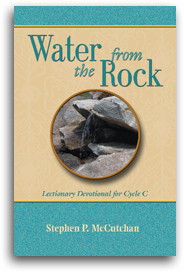Proper 27 / Pentecost 25 / Ordinary Time 32
Devotional
Water From the Rock
Lectionary Devotional for Cycle C
Object:
In the resurrection, therefore, whose wife will the woman be? For the seven had married her.
-- Luke 20:33
The Sadducees cleverly tried to trap Jesus with this shrewd question. When the church engages in a debate about faith, people tend to choose sides and then try to trap each other with clever questions. The debate becomes a game of trying to defeat the other side and ceases to be a hunger for the truth.
Luke made clear that the Sadducees did not believe in the resurrection. Based on that premise, they devised a question that they believed showed them to be right. The scenario they built was based on a Levitical law (Deuteronomy 25:5) about preserving the family line. A brother of a man who died childless had a responsibility to marry the widow and have a child that would bear the deceased person's name. They believed that the case they had developed made the idea of resurrection look ridiculous. Jesus used their question as an opportunity to teach them about the character of the life of the resurrection.
He suggested that in the life of the resurrection people neither married nor were given in marriage. He then suggested that marriage was a product of our finite world. The capacity to love one another in eternity would be free of the issues of fear, jealousy, and insecurity that marriage customs help us cope with. While such a radical idea might make us nervous, it does transform our concept of love from needing to possess other people into the capacity to be loving toward everyone.
-- Luke 20:33
The Sadducees cleverly tried to trap Jesus with this shrewd question. When the church engages in a debate about faith, people tend to choose sides and then try to trap each other with clever questions. The debate becomes a game of trying to defeat the other side and ceases to be a hunger for the truth.
Luke made clear that the Sadducees did not believe in the resurrection. Based on that premise, they devised a question that they believed showed them to be right. The scenario they built was based on a Levitical law (Deuteronomy 25:5) about preserving the family line. A brother of a man who died childless had a responsibility to marry the widow and have a child that would bear the deceased person's name. They believed that the case they had developed made the idea of resurrection look ridiculous. Jesus used their question as an opportunity to teach them about the character of the life of the resurrection.
He suggested that in the life of the resurrection people neither married nor were given in marriage. He then suggested that marriage was a product of our finite world. The capacity to love one another in eternity would be free of the issues of fear, jealousy, and insecurity that marriage customs help us cope with. While such a radical idea might make us nervous, it does transform our concept of love from needing to possess other people into the capacity to be loving toward everyone.


